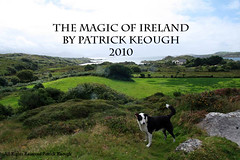The Web-Enhanced Photography Curriculum
or Yes…It is possible to teach Photography Courses online.
Click Image for Podcast Presentation Overview
A variety of strategies, online instructional design methods and techniques for incorporating Blackboard (Instructional Delivery Software) in the Photography (and/or) Arts Curriculum will be presented. It has been said that online teaching is more conducive for theory based courses – Keough’s presentation will attempt to de-construct this myth by showing a variety of photography and art courses actually in session (photojournalism, portrait photography, commercial illustration and computer art) being taught with web-enhancement. Techniques for incorporating digital images, video clips, external web resources, Blogs and Audio Podcasts will also be demonstrated in this practical “user-friendly” presentation.


The web-enhanced Photography Curriculum is capable of empowering both students and teachers to investigate and explore course material, photographic concepts, methods and techniques in a variety of innovative ways. The online environment also adds flexibility and accountability into the class no matter what the course content.
A major aspect of our instruction as photo educators focuses on effective communication and a fluid exchange of ideas, concepts, technical information and images.


Blackboard is a powerful instructional delivery TOOL affording students and teacher’s more creative options and alternatives for enhancing the learning process not matter what the course curriculum – in fact it is ideal for photography, art and programs that not only theory based, but hands-on and visual as well.


This is an exciting time to be an educator. The internet and new innovations in online instructional delivery is opening new doors for photo and art instructors around the country.
Over the past 8 years I have posted my photography and art course content (syllabi, course outlines, lectures, assignment examples, audio files and video clips) to my various course blackboards.

Students in the Photography Program at CCC are now able to access and review (once registered and assigned passwords) examples of past student work, assignments and a variety of specified course materials, in addition to receiving weekly progress reports, critiques and grades all tracking their progress.

A great example of this instructional tool in action is our Photojournalism and Portrait Photography Courses.


Our web enhanced photo curriculum has added a whole new dimension to our Photography Program. The studio/classroom/darkroom environment and the online environment are seamlessly interfaced to the point where we weave in and out of the two modes of teaching and communicating to our students fluidly with no compartmentalization in our teaching methodology.


Once students get used to checking their course Blackboards regularly, instructors can engage and challenge students to push beyond the limitations of the traditional classroom/lab experience. I even incorporate digitized video clips and podcasts that reinforce the key points of the material we are covering or that have been demonstrated in class.

 Portrait Photography Podcast Orientation
Portrait Photography Podcast Orientation
 Renaissance Video Clip
Renaissance Video Clip
Our students search the web to generate creative ideas for their own work and solutions to assigned photographic problems, in addition to sharing their findings with the rest of the class on the discussion board.


As the instructor I feel more empowered than ever before and I know my students do as well. I facilitate their learning experience using the web as a supplement (and instructional tool) for my regular classroom, studio and darkroom activities. It is also the primary place where my students are accountable for a variety of class assignments and projects.


Our classroom is now the world and students have the opportunity to explore the diverse world of photography like they never have before.


We also post examples of student work in our online classroom (to help them generate ideas) in addition to showing examples of specified class projects to help them with concept development.
We offer courses that are taught totally online (History of Photography, and Art Appreciation) in addition to hybrids of the traditional classroom supplemented with web (blackboard) components.
We believe online course delivery offers both teacher and student more educational options and alternatives and adds an element of flexibility and creativity into all our courses.
Students are now more responsible for their learning and are able to push themselves beyond the limitations of the traditional / studio classroom environment.


With the use of compressed digitized video and audio clips (podcasts) we are also able to give our courses a personal touch which takes the online course to a whole new level.
Click here for Photojournalism Podcast Orientation
The web-enhanced course reinforces accountability yet offers students a variety of ways for accomplishing course goals and objectives.


Once students understand your expectations and the methodology of the course you are able to engage and inspire students on a variety of levels over and above the traditional classroom environment. Each week there is a lecture / demonstration presented to the students on some aspect, technique and/or photographic process that relates to the specific course. Students are then expected to post progress reports and jpg versions of their images to a specified course discussion board.


This lets the instructor know he/she is moving forward with the assignment for accountability and then the actual print (prints) are due for critique the following week. So essentially each instructional module is treated like a workshop with a lecture/demo then lab time to accomplish the goals of the assignment. The blackboard is our way of keeping track of where students are on a given assignment and it demands ACCOUNTABILITY from the students. Lectures, podcasts, examples and video clips are also posted to the course blackboard for the students to refer to.
We can no longer totally rely on the archaic industrial age educational models to teach our students skills they’ll need to succeed and thrive in a highly technological, creative and entrepreneurial work environment.



This can no longer be accomplished with yesterdays outmoded teaching methods. The didactic talking head standing in front of neat rows of students imparting knowledge on a given subject is no longer effective or viable when compared to the way global businesses and industries conduct business over and through complex and secure digital networks. The photographic industry has embraced and continues to harness a variety of sophisticated communications and educational technologies such as video conferencing, Podcasting, streaming video, interactive online forums, blogs and digital informational / educational media (content) exchanges.
 Click Here for DL Podcast
Click Here for DL Podcast
The web provides a vast amount of information for instructors who truly understand how to apply, channel and integrate this vast amount of viable web content into their courses. Distance learning provides the best (and most flexible) instructional environment for connecting and exposing photography and art students to the resources (and information) being generated exponentially around the world. Recently Carteret Community College applied and was accepted into the Apple’s ITunes University System. This will enable us to store and distribute our course content (instructional podcasts, video clips, music, ect.) in the ITunes Educational directory. Yes…this is a very exciting time to be an educator with all these new digital tools and instructional delivery systems available to us. Let’s take a look at a few online Photo courses in session now.  Click Here for BB
Click Here for BB






Patrick – GREAT job!!
L.
Hey Patrick!
Great presentation!
How do I see your on-line blackboard courses?
I wanted to see more.
Thanks!
Greeting Tim. You can go in as my guest if you like. All I ask is that you don’t post to any of the students – just take a look at what is going on and how I have the courses set up. The courses that will come up on the right of the page are the ones in session now. Let me know if you have any questions.
http://blackboard.carteret.edu/
keoughp
art
cheers
Patrick
Love it! Man, you are really taking things to the next level and beyond.
Pingback: Teaching with Technology 2006 - ECU « Peregrinations
I woul like to attend to gain new skills
Hi Patrick,
Very inspirational presentation. I’ll be teaching digital photo courses next year and would like to get a look at your courses. Is that possible?
Thanks.
thanks for info very useful great post.
good info on photography side of things, thanks
Pingback: Curriculum Web Ideas | More More Pics
Hi Patrick,
I am very interested in viewing your BB course too. I teach High School Photography and am in the process of learning BB and I would love to see more!
Thanks,
Chris
I create a comment whenever I especially enjoy a article on a website or if I
have something to add to the conversation.
Usually it is a result of the sincerness displayed in the
article I browsed. And after this post The Web-Enhanced Photography Curriculum | KeO
BLoG. I was actually moved enough to drop a comment 😉 I actually do have a few questions
for you if you usually do not mind. Could it be just
me or does it look as if like a few of the remarks appear like they are left by brain dead people?
😛 And, if you are posting on other sites, I’d like to keep up with you. Would you make a list all of all your communal pages like your Facebook page, twitter feed, or linkedin profile?
Appreciate it from Monteith 😉